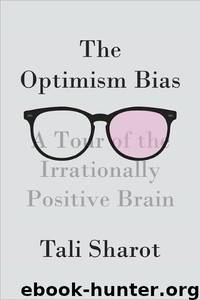The Optimism Bias: A Tour of the Irrationally Positive Brain by Tali Sharot

Author:Tali Sharot
Language: eng
Format: mobi, azw3, epub
ISBN: 0307378489
Publisher: PANTHEON
Published: 2011-06-14T00:00:00+00:00
The “Survivor” Dilemma
The answer is complex. This is because the value of anticipation is not the only factor that determines when we decide to indulge. There is at least one other crucial factor: temporal discounting. Temporal discounting is the tendency to value the present more than the future. For example, if you are given a choice between receiving $100 today or $100 in a month, you will most likely take the money today. That’s an easy decision. However, given a choice between $100 today and $105 in a month, what will you do? Most people would rather have $100 today than $105 in a month. Some people would even take $100 today over $150 next month.15
At first glance, and indeed at second, it seems that temporal discounting steers our decisions in a direction opposite from anticipation; it drives us to consume goods as soon as possible and delay pain until sometime in the unforeseeable future. This is not only because we tend to value the here and now more than the there and later but also because we (correctly) perceive the future as uncertain.16 We would rather eat our chocolate cake now than save it for later, because tomorrow we may find that the cat has already gobbled it up. We may decide to delay cleaning the house until next week, because by then our spouse may have already gotten around to it. However, if we know for certain that our spouse has no intention whatsoever of cleaning the house, we may decide to get to it as soon as possible and be done with it. Likewise, if we had a crystal ball that revealed that our scrumptious chocolate cake would stay fresh in the fridge and would not be eaten by anyone else, we might delay gratification a bit longer to prolong anticipation. However, even if we lived in a magical universe with a fully predictable future, people would still discount the future to some extent. If we did not discount the future at all, we would never get around to actually eating the cake or opening that precious bottle of wine we had been saving in the cellar. We would keep delaying gratification again and again in order to extend pleasurable anticipation.
Anticipation and temporal discounting pull us in different directions until an equilibrium is reached. While the pleasure of anticipation makes us patient creatures, temporal discounting makes us impulsive. What we will ultimately decide to do reflects the balance between these two factors. When the value obtained from anticipating a future reward is greater than the value of consuming the reward at present, we will delay our indulgence. However, when our desire to have the gourmet Swiss chocolate is greater than the joy of savoring it, we will tear into the wrapper.
Many factors play a part in whether or not we will ultimately savor a product. Things that are available infrequently (such as an expensive bottle of champagne or an annual vacation) may be worth savoring. Something that can be had again and again (such as a kiss from our partner) is consumed whenever we feel the urge.
Download
The Optimism Bias: A Tour of the Irrationally Positive Brain by Tali Sharot.azw3
The Optimism Bias: A Tour of the Irrationally Positive Brain by Tali Sharot.epub
This site does not store any files on its server. We only index and link to content provided by other sites. Please contact the content providers to delete copyright contents if any and email us, we'll remove relevant links or contents immediately.
The Art of Thinking Clearly by Rolf Dobelli(8842)
The 5 Love Languages: The Secret to Love That Lasts by Gary Chapman(8497)
Mindhunter: Inside the FBI's Elite Serial Crime Unit by John E. Douglas & Mark Olshaker(7834)
Becoming Supernatural by Dr. Joe Dispenza(7106)
The Road Less Traveled by M. Scott Peck(6635)
Nudge - Improving Decisions about Health, Wealth, and Happiness by Thaler Sunstein(6633)
Enlightenment Now: The Case for Reason, Science, Humanism, and Progress by Steven Pinker(6405)
Win Bigly by Scott Adams(6312)
Mastermind: How to Think Like Sherlock Holmes by Maria Konnikova(6236)
The Way of Zen by Alan W. Watts(5800)
Factfulness: Ten Reasons We're Wrong About the World – and Why Things Are Better Than You Think by Hans Rosling(4022)
The State of Affairs by Esther Perel(3931)
Gerald's Game by Stephen King(3918)
Man's Search for Meaning by Viktor Frankl(3634)
The Confidence Code by Katty Kay(3566)
Thinking in Bets by Annie Duke(3531)
The Worm at the Core by Sheldon Solomon(2917)
Enlightenment Now by Steven Pinker(2917)
Liar's Poker by Michael Lewis(2812)
